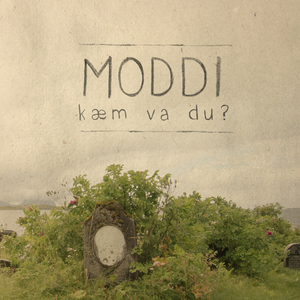www.moddi.no
Vi Slakta Sau
Moddi Lyrics
Jump to: Overall Meaning ↴ Line by Line Meaning ↴
som marlake og bottlangsbror.
Kver innmat-del, kver pølsetarm
som kunne nøttes, hadde namn.
Vi slakta sau på fløan sjy,
rundt Vinterdag, ved måne-ny.
De gamle hadde trua på
Vi slakta sau vi tappa blod.
Eg stramma tau mens far min slo.
Eg grudde meg, men lærte fort:
Det va førr maten det blei gjort.
Vi slakta sau. Det måtte te.
Vi spretta skank og knekte lé
og tomma skinn til dyret hong
som naken skrott i tau og stong.
Vi slakta sau på fløan sjy,
rundt Vinterdag, ved måne-ny.
De gamle hadde trua på
at kjøttet drygdes meire då vi slakta sau.
No slaktes sau på transportband.
Så glømmes ord og arbeidsgang,
og en kultur fra gammel tid
kan skrives ned til null verdi.
Vi slakta sau på fløan sjy,
rundt Vinterdag, ved måne-ny.
De gamle hadde trua på
at kjøttet drygdes meire då vi slakta sau!
In Moddi’s song "Vi Slakta Sau" or "We Slaughtered Sheep", the lyrics tell the story of a rural farming community that engages in the traditional practice of slaughtering sheep for food. The community takes great pride in their ability to use every part of the animal, from the meat to the intestines, and they have developed specific phrases and names for each part. The song highlights how different generations have different beliefs about the process of slaughtering animals, with the older generation believing that the meat is better quality when the animal is slaughtered during the winter moon phases, while the younger generation is indifferent.
The lyrics also speak to the idea that the act of killing animals for food is simultaneously an act of violence and sustenance. The singer recounts his experience of helping his father slaughter the sheep and how it was a difficult process, but necessary for the survival of their family. While the song is nostalgic for the old ways of slaughtering animals, it recognizes the necessity of the mass production of meat in modern times, but warns against forgetting the importance of traditional practices and values.
Overall, "Vi Slakta Sau" is a contemplative and soulful nod to the timeless cycle of life and death that forms the bedrock of human civilization.
Line by Line Meaning
Vi slakta sau. Vi lærte ord
We slaughtered sheep. We learned words
som marlake og bottlangsbror.
like marlake and bottlangsbror.
Kver innmat-del, kver pølsetarm
Grind every inner part, grind every sausage casing
som kunne nøttes, hadde namn.
that could be enjoyed, had names.
Vi slakta sau på fløan sjy,
We slaughtered sheep with gravy,
rundt Vinterdag, ved måne-ny.
around winter day, during the new moon.
De gamle hadde trua på
The old people had faith
at kjøttet drygdes meire då vi slakta sau.
that meat would last longer when we slaughtered sheep.
Vi slakta sau vi tappa blod.
We slaughtered sheep, we drained blood.
Eg stramma tau mens far min slo.
I tightened the rope while my father struck.
Eg grudde meg, men lærte fort:
I was afraid, but I learned quickly:
Det va førr maten det blei gjort.
It was done for the sake of food.
Vi slakta sau. Det måtte te.
We slaughtered sheep. It had to be done.
Vi spretta skank og knekte lé
We broke the shin and snapped the bone
og tomma skinn til dyret hong
and emptied the skin while the animal hung
som naken skrott i tau og stong.
like a naked corpse on rope and pole.
No slaktes sau på transportband.
Now sheep are slaughtered on a conveyor belt.
Så glømmes ord og arbeidsgang,
So words and processes are forgotten,
og en kultur fra gammel tid
and a culture from old times
kan skrives ned til null verdi.
can be written down as worthless.
Vi slakta sau på fløan sjy,
We slaughtered sheep with gravy,
rundt Vinterdag, ved måne-ny.
around winter day, during the new moon.
De gamle hadde trua på
The old people had faith
at kjøttet drygdes meire då vi slakta sau!
that meat would last longer when we slaughtered sheep!
Contributed by Leah H. Suggest a correction in the comments below.
